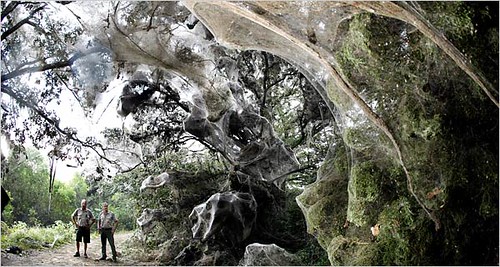
Tom Pennington/Fort Worth Star-Telegram, via Associated Press
First, rock snot. Now, giant spider webs that cover acres. One more screwy thing, and I'm stocking up on canned goods. From the New York Times:
Most spiders are solitary creatures. So the discovery of a vast web crawling with millions of spiders that is spreading across several acres of a North Texas park is causing a stir among scientists, and park visitors.Sheets of web have encased several mature oak trees and are thick enough in places to block out the sun along a nature trail at Lake Tawakoni State Park, near this town about 50 miles east of Dallas.
The gossamer strands, slowly overtaking a lakefront peninsula, emit a fetid odor, perhaps from the dead insects entwined in the silk. The web whines with the sound of countless mosquitoes and flies trapped in its folds.
Allen Dean, a spider expert at Texas A&M University, has seen a lot of webs, but even he described this one as "rather spooky, kind of like Halloween."
Mr. Dean and several other scientists said they had never seen a web of this size outside of the tropics, where the relatively few species of "social" spiders that build communal webs are most active.
Norman Horner, emeritus professor of biology at Midwestern State University in Wichita Falls, Tex., was one of a number of spider experts to whom a Texas Parks and Wildlife Department biologist sent online photos of the web. "It is amazing, absolutely amazing," said Dr. Horner, who at first thought it an e-mail hoax.
The web may be a combined effort of social cobweb spiders. But their large communal webs generally take years to build, experts say, and this web was formed in just a few months.
Or it could be a striking example of what is known as ballooning, in which lightweight spiders throw out silk filaments to ride the air currents. Five years ago, in just that way, a mass dispersal of millions of tiny spiders covered 60 acres of clover field in British Columbia with thick webbing.
Mike Quinn, the state biologist who distributed the online photos, and who runs a Web site about Texas invertebrates, plans to drive to the park from Central Texas on Friday in an effort to get some answers by collecting samples.
Record-breaking rains that flooded Texas earlier this summer inspired outbreaks of crickets and "webworms," the caterpillar larvae of the white moth. Mr. Quinn said the rains might have something to do with the web, too.
"You'd have to get a lot of spiders together and feed them a whole lot of food to make a web that big," he said.
Whatever caused the vast web, the sight of it has inspired both awe and revulsion.
"It's beautiful," said the park's superintendent, Donna Garde.
Freddie Gowin disagrees. It was Mr. Gowin, a maintenance worker at the park, who discovered the web this month when, taking advantage of some of the first dry weather, he mowed the area around the nature trail.
"I don't think there's anything pretty about it," he said, though "it's certainly unusual."
When Mr. Gowin drives the power mower through the area, webbing wraps across his bare face, causing him to slap at spiders, real or imagined, crawling on his skin.
The park's staff says that while the web has killed some leaves, it should not hurt the trees.
The spiders are "spreading out for sure," Mr. Gowin said, pointing out cedars that appeared to have a dusting of snow. "They're going to take over this whole point."
The staff expects the web to last until colder weather this fall, when the spiders begin dying off.
When someone figures out what the hell is going on, it's going to be really interesting.

I thought the first one was the manatee invasion of New York.
I think it's pretty obvious what went on here. You probably have a couple of million spiders per hatch, but 99.9% of them die off, because there just isn't enough food for all of them. You usually have a hatch of a couple of million flying critters, most of whom die off because there isn't enough water or algae or whatever their larvae depend on. Massive rains, and all the flying critter larvae survive, and all of a sudden there's enough food for all the little spiders, so they all survive.
That's just really disturbing. I don't care how they got there, but if I lived in that area, I would just want them to go away. Spiders really, really creep me out. I couldn't imagine being the guy mowing, getting wrapped in that web. AARRGGHH!!
I, for one, welcome our new Arachnid Overlords.
bedava sohbet
thanks a lot
very good site